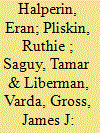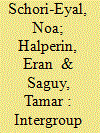|
|
|
Sort Order |
|
|
|
Items / Page
|
|
|
|
|
|
|
| Srl | Item |
| 1 |
ID:
134463


|
|
|
|
|
| Summary/Abstract |
The goal of the current project is to integrate psychological research on emotion regulation with the study of democratic practices in general and political intolerance in particular. We hypothesized that the use of a well-established emotion regulation strategy, cognitive reappraisal, would be associated with lower levels of group-based negative emotions toward one’s least-liked group and lower levels of political intolerance toward that group. Preliminary data based on nationwide survey conducted among Jews in Israel show that the tendency to reappraise negative emotions during war is associated with more tolerant attitudes. In studies 1 and 2, we experimentally manipulated reappraisal, and this led to reduced levels of political intolerance toward Palestinian Citizens of Israel (study 1) and toward one’s least-liked group (study 2). These effects were transmitted via a decrease in negative emotions in both studies, as well as by an increase in support for general democratic values in Study 2.
|
|
|
|
|
|
|
|
|
|
|
|
|
|
|
|
| 2 |
ID:
166003


|
|
|
|
|
| Summary/Abstract |
Despite their pernicious effect on intergroup conflict, collateral casualties are seen as inevitable and justified by many members of the groups involved, particularly those who endorse a right-wing ideology. Drawing on social psychological literature, we examined whether a perception of commonality between in-group and out-group can be beneficial for reducing tolerance to collateral causalities. We hypothesized that viewing the out-group as sharing commonalities with the in-group can reduce processes of out-group delegitimization, which are common among right-wingers in intractable conflicts, and may therefore serve to explain reduction in tolerance to collateral casualties. Three correlational studies were conducted among Jewish-Israelis in the context of the conflict with the Palestinians to test this. In Study 1, right-wing political ideology was associated with stronger support for enemy collateral casualties, and the effect was moderated by perceived intergroup commonality. While leftists were overall non-supportive of collateral casualties, rightists who perceived high intergroup commonality were less tolerant of collateral casualties than those low on intergroup commonality. In Study 2, conducted during violent escalation, we replicated these results while controlling for anger, fear, and hatred. In Study 3, we found that the effect was mediated by delegitimization of the out-group. These results extend the range of beneficial impact of intergroup commonality, and imply that it may be used as a tool to promote conflict resolution.
|
|
|
|
|
|
|
|
|
|
|
|
|
|
|
|
|
|
|
|
|